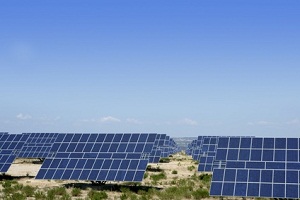Phoenix looks to contracted solar for energy goal
 The city of Phoenix, Ariz., announced earlier this week that it would pursue solar system contracts with private firms.
The city of Phoenix, Ariz., announced earlier this week that it would pursue solar system contracts with private firms.
The contracts would allow the city to offer land and space to companies that would finance, manufacture, install, and maintain solar panels. The city would then buy the power produced by the solar companies, said Dimitrios Laloudakis, Phoenix's energy manager.
“So, in terms of risk,” Laloudakis said, “there is very little risk other than the city offering space.”
While Phoenix’s focused pursuit of solar-system contracts is groundbreaking for a municipality, the method is growing in popularity. Several organizations and companies around the country, including the University of Phoenix and the Denver International Airport , have entered into contracts with solar companies, provided the space and bought the clean energy at a lower price than standard grid power.
“The system really calls for [the companies] to do everything correctly,” Laloudakis said. “As long as their systems perform, the city will pay, and the vendor will make more depending on how efficient their system is.”
Laloudakis also said the benefit is that private companies are eligible to take advantage of federal and even state solar grants, rebates, tax incentives and programs to cut the costs of launching a new solar program. Those government offerings can cut costs up to 30 percent, Laloudakis said. And the city government isn’t eligible for any of those savings benefits. The service contracts are a way for the city to take advantage of the clean energy opportunities without any big upfront investments, especially ones that cost more to the city than to private companies.
Phoenix opted to focus on solar rather than wind or biomass or hydrothermal energy production for obvious reasons.
“The ubiquitous resource we have here is solar,” Laloudakis said. “We don’t really have wind.”
The city is currently working up its vendor list and identifying possible locations for solar system contracts.
“We have some space we can take advantage of,” Laloudakis said. “We have some roofs, landfills, places we haven’t even thought of. I expect we’ll be able to produce power well into the megawatts.”
The new plan should help the city reach its goal of getting 15 percent of its energy from renewable sources by 2025, though Laloudakis said it could take six months or more before the city is ready to start any projects.



